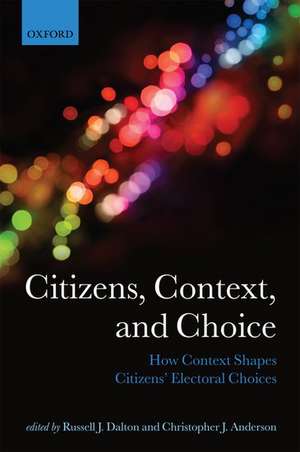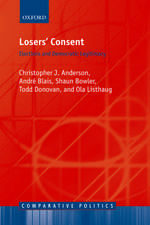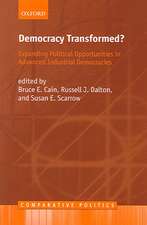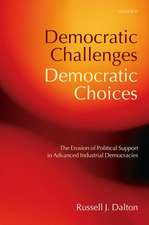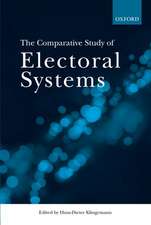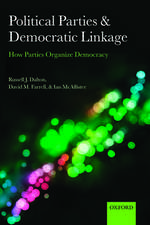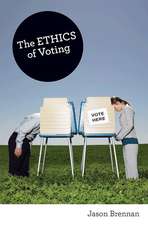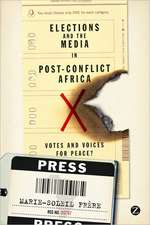Citizens, Context, and Choice: How Context Shapes Citizens' Electoral Choices: Comparative Study of Electoral Systems
Editat de Russell J. Dalton, Christopher J. Andersonen Limba Engleză Hardback – 2 dec 2010
Preț: 688.20 lei
Preț vechi: 1041.14 lei
-34% Nou
Puncte Express: 1032
Preț estimativ în valută:
131.69€ • 137.22$ • 109.04£
131.69€ • 137.22$ • 109.04£
Carte tipărită la comandă
Livrare economică 24-29 martie
Preluare comenzi: 021 569.72.76
Specificații
ISBN-13: 9780199599233
ISBN-10: 0199599238
Pagini: 314
Ilustrații: 1
Dimensiuni: 167 x 241 x 26 mm
Greutate: 0.64 kg
Editura: OUP OXFORD
Colecția OUP Oxford
Seria Comparative Study of Electoral Systems
Locul publicării:Oxford, United Kingdom
ISBN-10: 0199599238
Pagini: 314
Ilustrații: 1
Dimensiuni: 167 x 241 x 26 mm
Greutate: 0.64 kg
Editura: OUP OXFORD
Colecția OUP Oxford
Seria Comparative Study of Electoral Systems
Locul publicării:Oxford, United Kingdom
Recenzii
The integrative new institutionalism approach of context, institutions and political behaviour makes the book very readable.
Citizens, Context, and Choice is an important work that I think belongs on the shelves of all scholars of political behavior. It covers a lot of ground and does so in a focused and rigorous way, building on what we already know about political behavior and yet challenging our understanding.
This volume provides a coherent and ground-breaking account of the subtle ways in which formal and less formal institutions may affect voting behaviour. The use of multilevel analytic methods coupled with new finer measures of political organisation (such as the effective number of parties, and of course party polarization) is to be commended... this volume certainly provides an insightful and rigorous study of the dynamics of voting.
Citizens, Context, and Choice breaks important new ground in the study of voting behavior, with an exceptionally talented set of contributors providing a variety of studies of how macropolitical contexts affect individuals' electoral choices. The papers are uniformly very good, but this volume is also much more than the sum of its parts. It develops more fully than has ever been done before the concept of "political supply" - the number, distinctiveness, and predictability of choices offered to the voter. And through a number of empirical studies it demonstrates that political supply is a central factor in understanding citizens' choices to participate and the meaning of their vote. This is work that will have to be taken account of in all further studies of electoral choice.
Citizens, Context, and Choice is an important work that I think belongs on the shelves of all scholars of political behavior. It covers a lot of ground and does so in a focused and rigorous way, building on what we already know about political behavior and yet challenging our understanding.
This volume provides a coherent and ground-breaking account of the subtle ways in which formal and less formal institutions may affect voting behaviour. The use of multilevel analytic methods coupled with new finer measures of political organisation (such as the effective number of parties, and of course party polarization) is to be commended... this volume certainly provides an insightful and rigorous study of the dynamics of voting.
Citizens, Context, and Choice breaks important new ground in the study of voting behavior, with an exceptionally talented set of contributors providing a variety of studies of how macropolitical contexts affect individuals' electoral choices. The papers are uniformly very good, but this volume is also much more than the sum of its parts. It develops more fully than has ever been done before the concept of "political supply" - the number, distinctiveness, and predictability of choices offered to the voter. And through a number of empirical studies it demonstrates that political supply is a central factor in understanding citizens' choices to participate and the meaning of their vote. This is work that will have to be taken account of in all further studies of electoral choice.
Notă biografică
Russell J. Dalton was the founding director of the Center for the Study of Democracy at UC Irvine. He has received a Fulbright Professorship at the University of Mannheim, a Barbra Streisand Center fellowship, German Marshall Research Fellowship and a POSCO Fellowship at the East/West Center. His scholarly interests include comparative political behavior, political parties, social movements, and empirical democratic theory. He is Professor of Political Science at the University of California, Irvine. Christopher J. Anderson is a team member of the Persistent Poverty and Upward Mobility theme project organized by Cornell's Institute for the Social Sciences and the international collaborative project on Making Electoral Democracy Work funded by the Social Sciences and Humanities Research Council of Canada. His research focuses on contextual models of politics that view political actors as nested in a variety of social, economic, and political environments that shape and constrain behavior. In particular, he studies how differences in macro-political contexts across countries shape people's cognition and action. He has long been interested in popular consent and inequality in democracies and has written on the popularity of governments, the legitimacy of political institutions, and the link between welfare states and citizen behavior. He is Professor of Government and Director of the Institute for European Studies at Cornell University.
